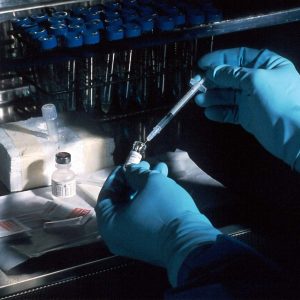How to Become a Forensic Genealogist

Forensic genealogy is an industry that is growing at a rapid pace. As DNA technology continues to advance and more people take advantage of DNA registration and genealogical databases, law enforcement and other researchers have more access to genealogical data than ever before. Education in forensic genealogy trains individuals to work with this data and potentially interface with criminal investigators to solve genealogical mysteries.
It should be noted that forensic genealogy and forensic genetic genealogy (also known as investigative genetic genealogy) are not exactly the same. A forensic genealogist helps identify next of kin or find lost relatives in the case of an inheritance in a will, for land and mineral rights, or even to repatriate the remains of soldiers killed in foreign wars.
On the other hand, a forensic genetic genealogist is an expert who helps law enforcement identify human remains or track potential suspects based on familial DNA evidence. Forensic genetic genealogists are behind the biggest news stories related to familial DNA, such as the evidence that led to the apprehension of the Golden State Killer in 2018. Career paths and opportunities for both positions have similar requirements.
Forensic Genealogist Career Path
Depending on the type of work environment an aspiring forensic genealogist chooses, they may work in a lab or in genealogical research. Genealogical research includes searching through online archives as well as going in person to libraries and other document repositories to find the genealogical information needed. Strong research skills are an important part of earning many undergraduate degrees, so this is certainly something to consider when choosing a major.
The best path to becoming a forensic genealogist starts with a strong educational foundation. Most forensic genealogists or forensic genetic genealogists have at least a bachelor’s degree and may have a master’s degree or PhD in a forensic science-related field.
Most specialty training for forensic genealogists comes while on the job, working in a crime lab, for a law enforcement agency, or for an independent investigator. Because the field is still somewhat new, career avenues are being discovered all the time.
Forensic Genealogist Education
Although no specific bachelor’s degree program is available with a forensic genealogy focus, earning an undergraduate degree in a related field is recommended. For students who know they want to pursue forensic genealogy, choosing a forensic science program, such as the one available at The College of Saint Rose, can be a great place to start. A forensic science undergraduate degree gives students the basics of working in a lab, liaising with law enforcement agencies, and a general understanding of forensic science processes.
In addition to undergraduate work, there are professional certificates that support on-the-job training. Organizations such as the Association for Professional Genealogists (APG) and the National Institute for Genealogical Studies offer training and networking opportunities for aspiring forensic genealogists.
Forensic Genealogist Salary and Demand
Because forensic genealogy is still a fairly new field with few experts employed full time, it’s difficult to speculate about an expected salary for a forensic genealogist. According to the Bureau of Labor Statistics (BLS), the median salary for forensic science technicians in 2021 was $61,930 per year. The demand for forensic science technicians is expected to grow by 11% between 2021 and 2031, which is much faster than the average for all other occupations.
Although this data is not specific to forensic genealogy, it can be assumed that the demand for the position will grow, and salaries may come in a bit higher than average since it is a specialized position.
Forensic Genealogist Graduate Programs
As with undergraduate degrees, no formal graduate degrees are offered in forensic genealogy. However, some institutions do offer graduate certificate programs. Earning a graduate certificate in forensic genealogy includes taking courses in Genealogical Principals and Methods, Fundamentals of Forensic Biological Evidence, and hands-on practicum experience. It’s also important to note that there is no formal certification process for forensic genealogists, and professional credentials are optional.
Forensic Science at Saint Rose
At Saint Rose, both chemistry and biology-focused tracks are available for undergraduates, depending on a student’s interest. Undergraduate students at Saint Rose can also participate in projects associated with the Cold Case Analysis Center (CCAC), where forensic science students work on real cold cases with law enforcement support.
The CCAC offers a unique opportunity for undergraduates to gain hands-on experience in the latest forensic investigative techniques, including forensic genealogy.
If you are interested in learning more about the forensic science programs available at Saint Rose, visit the forensic science program page and download the complete guide.

Learn More About the Forensic Science Program at Saint Rose
To take the first step towards a long, fulfilling career, request more information about these programs at Saint Rose.
Request More Info
Request more information to learn about how the advisors at Saint Rose can help you achieve your professional goals or enter fields such as forensic science. We’re eager to help you reach your full potential.

